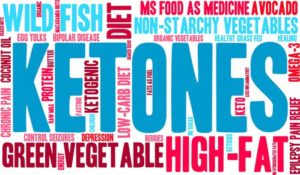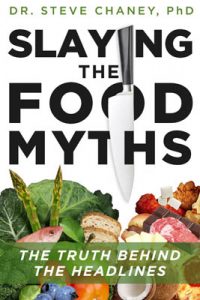Where Do Food Myths Come From?
 I don’t need to tell you that the keto diet is popular right now. It is touted for weight loss, mental sharpness, and improved health. I discuss the accuracy of those claims in my book, “Slaying the Food Myths”.
I don’t need to tell you that the keto diet is popular right now. It is touted for weight loss, mental sharpness, and improved health. I discuss the accuracy of those claims in my book, “Slaying the Food Myths”.
Perhaps more surprising has been the adoption of the keto diet by so many endurance athletes. As I point out in my book, there is a kernel of truth for that idea. Fats and ketone bodies are a very efficient energy source for low to moderate intensity exercise, and we have a virtually unlimited source of stored fat that can be converted to ketone bodies.
However, I always add this caveat, “The keto diet is perfect for endurance exercise – as long as you don’t care how fast you get there”. That is because high intensity exercise requires muscle glycogen stores, which come from the carbohydrates we eat. When you cut carbs from the diet, you deplete your glycogen stores.
And, if you are running a marathon and you want to sprint to the finish line, you will need those muscle glycogen stores. Or, if you are in a cycling event and you want to power up a mountain, you will need those glycogen stores.
Of course, you are probably asking, “Why do so many endurance athletes swear by the keto diet?” There is a dirty little secret behind athlete endorsements. I’m not talking about the money that top athletes get paid for endorsements, although that is also a problem.
I’m talking about the testimonials you hear from your friend who runs marathons or your personal trainer. Unfortunately, testimonials from athletes are notoriously unreliable. The problem is that the placebo effect approaches 70% for athletes.
Competitive athletes are strong willed. If they think a diet or sports nutrition product will help them, they will themselves to a higher level of performance. And this happens subconsciously. They aren’t even aware that their mind is influencing their performance.
So, just because your favorite athlete endorses the keto diet doesn’t mean it is the perfect diet for you. Testimonials can be very misleading.
The important question to ask is, “Do clinical studies support the keto diet as the best diet for endurance exercise?” But, before I answer that question, let me frame the question by asking. “Where do food myths come from?” because the belief that keto diets are best for endurance exercise is a classic food myth.
Where Do Food Myths Come From?
I discussed this question at length in my book, “Slaying The Food Myths”. Let me summarize it briefly here.
 Secrets Only Scientists Know: First you need to know the secrets only scientists know. Here are the top 2:
Secrets Only Scientists Know: First you need to know the secrets only scientists know. Here are the top 2:
#1: Scientists design their studies to disprove previous studies. There is no glory for being the 10th person to confirm the existing paradigm. The glory comes from being the first to show the existing paradigm might be wrong. While this may seem to be a contrary approach, it is actually the strength of the scientific method.
However, it means that there will be published clinical studies on both sides of every issue.
#2: Every study has its flaws. There is no perfect study.
This is why the scientific community doesn’t base their recommendations on 2 or 3 published studies. We wait until there are 10 to 20 good quality studies and base our recommendations on what 90% of them show.
Now, let me contrast the scientific approach with how food myths are born.
Where Do Food Myths Come From? Food myths usually originate on blogs or websites. Often the articles are written by people with no scientific credentials. But some of them are written by doctors (I will call them Dr. Strangelove to “protect the guilty”). The articles they write have these things in common:
- The articles are based on the biases of the author. No effort is made to look at the other side of the story.
- The authors “cherry pick” studies that support their bias and ignore studies that contradict them.
- They use scientific-sounding mumbo jumbo to make their hypothesis sound credible.
- Their articles are usually spectacular. For example, they say things like, “A particular diet, food, or supplement will either cure you or kill you”, and/or “The medical community is hiding the truth from you.”
- They never let the facts get in the way of a good story.
Since the idea sounds credible it is picked up by other blogs and websites without any fact checking (social media at its worst). Once it has been repeated often enough, it becomes generally accepted as true. It becomes a food myth. From that point on, studies that disprove the myth are often ignored.
How do you know whether a common belief is true, or just another myth? The only way to be sure is to take a balanced look at all the clinical studies, not just the studies that support the belief.
That is what the authors of a recent review paper (CP Bailey and E Hennessy, Journal of the international Society of Sports Nutrition, 17, Article number: 33, 2020) did for the belief that the keto diet is the best diet for endurance exercise.
Is The Keto Diet Best For Endurance Exercise?
 Before I discuss the findings of the review article, there are two things you should know:
Before I discuss the findings of the review article, there are two things you should know:
#1: There is little scientific research on the effectiveness of the keto diet on endurance exercise. After an exhaustive search of the literature, the authors were only able to find 7 published studies on the topic.
#2:Most sports nutrition studies are of poor quality. In general, they are very small studies, are of short duration, and do not use common test procedures to measure a successful outcome. These studies on keto diets were no different. For example:
-
- The number of subjects in these studies ranged from 5 to 29 (average = 14).
-
- The duration of time on the diet in these studies ranged from 3 weeks to 12 weeks (average = 5 weeks).
-
- Tests used to measure the effectiveness of specific diets on endurance exercise were VO2max (the maximum amount of oxygen you can utilize during exercise), Time to exhaustion (how long you can exercise before you are exhausted), Rating of perceived exertion (feeling of fatigue at the end of the exercise), Race time (time required to complete an event), and Peak power output during the event.
-
- Four studies used a treadmill to simulate endurance exercise. The other three used a stationary bike.
-
- Five of the studies compared the keto diet to a high carbohydrate diet. Two studies used the keto diet only.
The results were all over the place:
- Two studies reported an increase in VO2max for both the keto diet and the high carbohydrate diet. One study reported a decrease in VO2max for both diets. The other studies reported no change in VO2max. In short, there was no difference between the diets for VO2max.
- One study reported a decrease in race time for the high carbohydrate diet and a non-significant increase in race time for the keto diet. Two other studies reported no effect of either diet on race time. In short, one study suggested the high carbohydrate diet was more effective at shortening race time. The other two studies found no effect of either diet.
- Two studies showed an increase in time to exhaustion for both diets. One study showed a decrease in time to exhaustion for the keto diet (participants got tired more quickly). That study did not include the high carbohydrate diet for comparison. In short, there was no clear difference between the two diets for time to exhaustion.
- One study showed that the group on the keto diet reported a higher rating of perceived exertion (were more tired) at the end of the endurance event than the group on the high carbohydrate diet. Another study found no difference between the two diets. In short, one study suggested the high carbohydrate diet was better with respect to perceived exertion (tiredness) at the end of the endurance event. Another study found no difference between the two diets.
- One study reported that peak power was significantly greater for the group on the keto diet than the group on the high carbohydrate diet. One of the studies with the keto group reported that peak power decreased for 4 out of 5 subjects on the keto diet. In short, one study suggested that the keto diet was more effective at increasing peak power than the high carbohydrate diet. Another study suggested the keto diet decreased peak power.
The authors concluded: “When compared to a high carbohydrate diet, there are mixed findings for the effect of the keto diet on endurance performance…The limited number of published studies point to a need for more research in this field.” I would add that we need larger, better designed studies, with common measures of exercise performance.
What Does This Mean For You?
 You may be wondering why I even bothered to talk about such poor-quality studies and a review that could not provide a definitive answer. In fact, that is exactly my point.
You may be wondering why I even bothered to talk about such poor-quality studies and a review that could not provide a definitive answer. In fact, that is exactly my point.
This is characteristic of the kind of “evidence” that Dr. Strangelove and his buddies present to support whatever food myth they are featuring on their website. They don’t know how to distinguish good studies from bad studies, and they “cherry pick” only the studies that support their food myth.
So, if you believe that the keto diet is best for endurance exercise, you can “cherry pick” the one published clinical study that supports your belief. You just need to ignore the other 6 published studies.
And, if you believe that a high carbohydrate diet is better for endurance exercise than the keto diet, you can “cherry pick” two clinical studies that support your belief. You just need to ignore the other 5 published clinical studies.
None of the studies are high-quality studies, and the effect of either diet on endurance exercise in these studies is miniscule.
In short, there is no convincing evidence that the keto diet is best for endurance exercise. Or, put another way, we do not have enough evidence to elevate that belief from a food myth to a recommendation we can confidently make for an endurance athlete.
The Bottom Line
A recent publication conducted an impartial review of the evidence for and against the popular belief that a keto diet is the best diet for endurance exercise. The review found only 7 poor-quality studies on this topic in the scientific literature, and the results of those studies were all over the map.
- One study reported the keto diet was better than a high carbohydrate diet for endurance exercise.
- Two studies reported that the high carbohydrate diet was better.
- The other 4 studies were inconclusive.
- None of the studies found a significant effect on endurance performance by either diet.
So, if you believe that the keto diet is best for endurance exercise, you can “cherry pick” the one published clinical study that supports your belief. You just need to ignore the other 6 published studies.
And, if you believe that a high carbohydrate diet is better for endurance exercise than the keto diet, you can “cherry pick” two clinical studies that support your belief. You just need to ignore the other 5 published clinical studies.
In short, there is no convincing evidence that the keto diet is best for endurance exercise. Or, put another way, we do not have enough evidence to elevate that belief from a food myth to a recommendation we can confidently make for an endurance athlete.
For more details, read the article above.
These statements have not been evaluated by the Food and Drug Administration. This information is not intended to diagnose, treat, cure, or prevent any disease.


